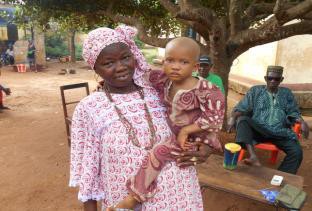“I’m grateful to StopPalu and USAID for giving me the training and skills to save the lives of the more vulnerable people in my community.”

Mairama Camara, a community health worker, with Fatoumala Diallo, who was successfully treated for malaria. Source: RTI International
In Guinea, malaria is the leading cause of health consultations, and is responsible for 31 percent of hospitalizations and 14.2 percent of deaths. All people, particularly children under 5 and pregnant women, are at risk.
To achieve universal coverage of malaria prevention and case management consistent with World Health Organization recommendations, in 2012, the Ministry of Health adopted a malaria community case management strategy.
In 2014, as part of the President’s Malaria Initiative (PMI), the StopPalu project trained more than 600 community health workers in 14 districts on behavior change, malaria prevention, the use of rapid diagnostic tests, management of simple cases using artemisinin-based combination therapy, and monitoring and evaluation. After training, each community health worker received a kit containing storyboards for behavior change activities, medicines, gloves, a waste disposal box and management tools such as a case management book, home visit forms and monthly reporting forms. Each worker conducts 24 home visits per month.
PMI is led by the U.S. Agency for International Development (USAID) and implemented together with the Centers for Disease Control and Prevention. The StopPalu project is implemented by RTI International.
In April 2014, during a round of home visits to promote healthy behaviors in the villages, Mariama Camara, a project-trained community health worker in the district of Forécariah, found a 5-year-old girl, Fatoumata Diallo, who had been sick with a fever for more than three days. She had all the signs of severe malaria. Camara performed a rapid diagnostic test and it was positive.
The parents, who were desperately worried about their daughter, would not go to the hospital and said that they did not have the means to pay the costs of treatment. After several attempts to explain the gravity of the situation, Camara convinced the parents that Fatoumata could be saved if she were taken to the hospital in the next hour. Camara accompanied Fatoumata and her parents to the urban health center where Fatoumata received adequate, effective and free care. After two days of treatment, she began to eat and play. The parents were so happy that they made Camara their daughter’s godmother.
“I’m grateful to StopPalu and USAID for giving me the training and skills to save the lives of the more vulnerable people in my community,” said Camara.
The StopPalu project, which runs from May 2013 through September 2016, is designed to assist the Government of Guinea in reducing malaria morbidity and mortality through multiple interventions in prevention, diagnosis and treatment, and capacity building of the Ministry of Health and the National Malaria Control Program.
This story was taken from www.usaid.gov.
